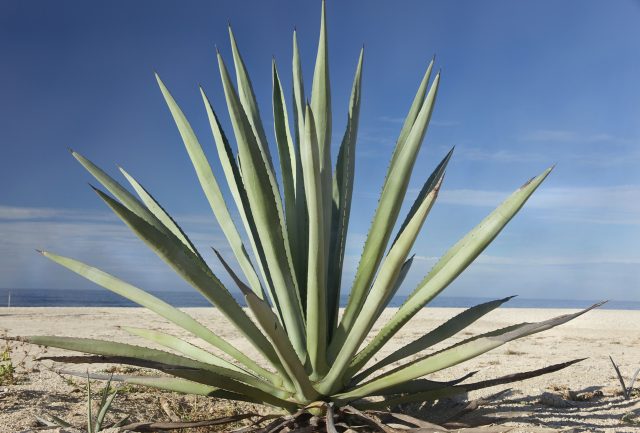Does Diageo’s fate rest on the shoulders of agave growers?
By Ron EmlerDiageo’s shares have been slipping by about 1.5% since Christmas. With the lion’s share of its profits coming by way of Tequila, analysts are asking whether a shortage of agave could spell disaster for the company.

Shares for Diageo, the world’s largest premium beverage alcohol group, are 12% below their £40.36 peak in December 2021 when drinks sector shares were soaring as the world unlocked from the coronavirus pandemic.
Is this a signal of investor disenchantment? Or is it simply a case of blue-chip stock taking a pause before resuming what has looked like a relentless march upwards over the past quarter of a century, the pandemic wobbles of 2020 notwithstanding.
The company has been getting mixed reviews.
On the positive side is the vote of confidence given by one of the world’s most admired (and followed) investors, Warren Buffett of Berkshire Hathaway.
Buffett has achieved almost legendary status with a portfolio worth more than US$325 billion. And since Christmas he has taken a US$41.3 million stake in Diageo.
That suggests that Buffett thinks this year’s share price performance is a minor blip and that Diageo fits his long-held strategy of using market downturns to pick up quality stocks that are highly profitable with a proven track record.
Its earnings growth over the past year exceeded the industry average, the company’s debt is well covered by earnings and the dividends (which have risen relentlessly for 25 years) are covered by earnings and cash flows.
That fits with the profile of Diageo accepted by many big fund managers who make it a core holding, generating dividends and share price growth.
But on the flip side, some analysts wonder whether Diageo’s recent growth has depended too much on American demand for Tequila and whether that can be sustained.
According to RBC Capital Markets, Tequila has contributed to more than half of the beverage giant’s profit growth since 2018.
This strong performance is largely due to Tequila’s premium pricing, approximately four times higher than Diageo’s overall portfolio, resulting in an estimated gross margin of around 90%.
Casamigos, the brand bought for US$1 billion from George Clooney and friends in 2017, grew by more than 400,00 cases to nearly 2.4 million last year, some 300,000 more than stable mate Don Julio, which sells more than 2 million cases.
Partner Content
Last year, export volumes to Europe also soared. Spain jumped by 90%, France by 73%, Britain by 68% and Germany by 60%, according to Mexico’s Tequila Regulatory Council. That compares with global growth of 23%.
Overall, Diageo’s Tequila sales grew by 79% in 2021 and 55% in 2022. And the lion’s share of that came from the US, which accounts for almost 40% of Diageo’s global sales.
From January to October last year, Tequila exports to the US were worth US$3.6 billion, a 34.1% increase on the same period for 2021.
Qui Tequila co-founder Pete Girgis recently told Fox News: “Agave and Tequila overall consumption has been skyrocketing. Agave prices have gone up 10 times from where they were 10 years ago and right now, Tequila has become one of the fastest growing spirits in the US for the first time ever, outselling US whiskey in this country.”
Yet, the future could be uncertain as climate changes could threaten agave supply from the Jalisco region of Mexico- the only permitted source for Tequila – as demand continues to soar.
As a result, RBC has expressed doubts about Diageo’s medium-term guidance of 5-7% sales growth and 6-9% profit growth.
Jose Luis Hermoso, research director for the IWSR, said: “Agave prices have remained close to record levels for the past three years. And bear in mind that it takes 7-8kg of agave to make one litre of Tequila. Prices will only start moderating when there are signs that Tequila is cooling down in the key US market.”
In its annual results commentary last July Diageo assured shareholders it had reviewed its supply chain and procurement strategy for Tequila, “which took into consideration management’s updated assessment as to the long-term volume growth of the category, the company’s approach to agave procurement and its capital investment requirements in direct operations and contracted supply”.
Meanwhile, Diageo’s Indian subsidiary last week announced buoyant fourth quarter figures. Profits were up by 7.3% against the same period in 2022.
In the three months to March 31, the offshoot made profits of almost £23 million, boosted by cost controls which more than offset slowing demand.
Although revenue from operations fell by 25%, net sales value rose 15.6% aided by a 23.2% growth in the prestige and above segment.
That ability to premiumise its portfolio is a key factor in many investors’ assessment that Diageo’s shares will soon return to the growth path, albeit at a measured pace..
Related news
The Wine Group to acquire six brands from Constellation




